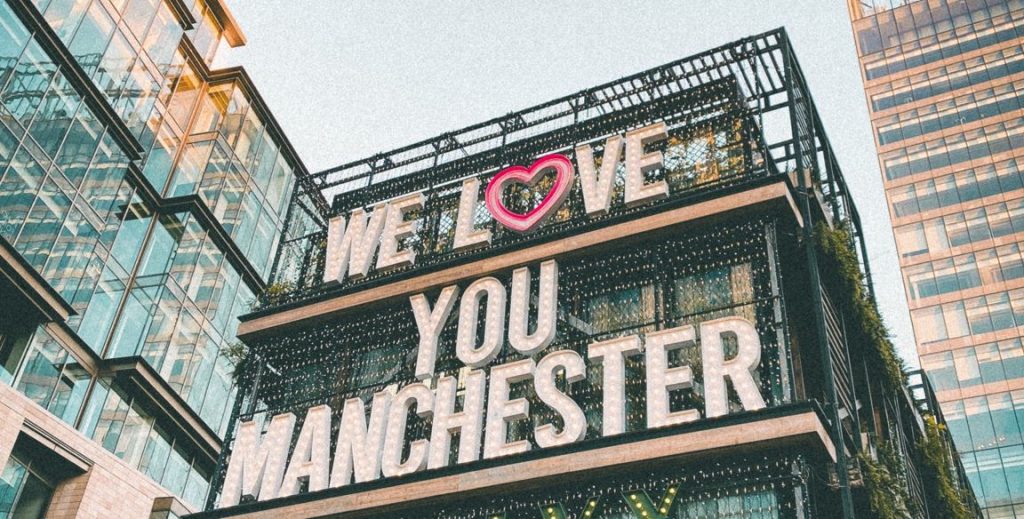
Sustainable Living in Manchester
Our students discuss their tips and tricks to living more sustainably when living in Manchester.
 Neve Meats – BA English Language, 2nd Year
Neve Meats – BA English Language, 2nd Year
“Understandably, sustainability is becoming a more widely advocated topic in everyday life as it offers a key point of interplay between our lives and helping tackle larger issues such as climate change. The question for us Manchester students is then, how can we implement sustainable ways of living into our lives?
Transport choices
How do you get around the city? Perhaps the most obvious answer is cycling. Most students use a bike to move around campus, as the wealth of cycle lanes in the city make this free option safe. Alternatively, if you don’t like to cycle but want a free way of getting around that’s faster than walking, why not take up the sport of skateboarding? Sound a bit farfetched? I recently took up the hobby when I saw student sessions were being run at Projekts MCR, near Piccadilly station. The equipment and teaching is provided, for around £6, so you can give it a go and see whether it could become your new mode of transport in student life.
More mainstream methods can be found in the plethora of train, tram and bus links around the city. These offer an easy choice which is sustainable and budget-friendly. Stagecoach offers student bus passes for Manchester (including Greater Manchester) services, and there is a help for students scheme, through which 147 Magic Bus between the North and South campus is free for all students from the University of Manchester, simply show your ID! Of course there are three free bus routes too, which link the city’s train stations.
Stagecoach: https://www.stagecoachbus.com/promos-and-offers/manchester/unirider
147 Magic Bus:https://www.stagecoachbus.com/promos-and-offers/manchester/magic-147
Small Everyday Changes
Water
Another sustainability scheme which is becoming widespread across the city is the Refill Manchester scheme. This offers free tap water refills across numerous refill taps in the city, all of which are listed in the Refill app, meaning you can easily locate the ones closest to you. Of course, the University also offers free water refills, but this app is useful for when you’re out and about in the city.
Refill: https://www.refill.org.uk/
Thrifting
Have you considered buying used instead of buying into fast fashion? Perhaps it’s something you already enjoy, in which case you’ll know Manchester is the ideal city for you. There are many charity and thrift shops across the city, including shops from Barnardos, the British Heart Foundation and vintage clothes shop Blue Rinse. Also, the University of Manchester Thrift Society runs organised outings to new shops, markets and their own swap-shops, for a membership of just £5 per year.
UoM Thrift Soc: https://manchesterstudentsunion.com/activities/view/thriftsoc
The University’s Stance
It’s no secret that the University is invested in promoting sustainability, through research, education and innovation. There is even a university-wide option to partake in the Ethical Grand Challenges for the Stellify award. Offered to all undergraduates, the challenges are Sustainability (year 1), Social Justice (year 2) and Workplace Ethics (year 3).
Ethical Grand Challenges: http://www.socialresponsibility.manchester.ac.uk/signature-programmes/ethical-grand-challenges/
Stellify: https://www.stellify.manchester.ac.uk/
I hope this has provided you with an insight into Manchester’s relationship with the concept of sustainability, and how you can play your part as a student here.”
 Camille Garratt – BA Social Sciences (BASS) – Philosophy and Politics, 3rd Year
Camille Garratt – BA Social Sciences (BASS) – Philosophy and Politics, 3rd Year
“If you’ve got the January blues this season why not head to a zero-waste shop and make a feel-good purchase, for you, and the environment, such as a new natural shampoo bar or a reusable razor! Here are my top picks for sustainable living in Manchester.
Lentils and Lather
One of the easiest and most impactful ways you can do your bit for the environment is by shopping at zero waste stores. Lentils and Lather situated on Burton Road, just past Withington, provides a plastic-free environment. This ethical shop can supply you with all the dried goods and bathroom products you need, just bring along some Tupperware boxes and refill as much as you’d like! They only buy their produce from in and around the Manchester area, reducing their carbon footprint, and supporting small local businesses. The best part is that their prices are reasonable because ‘looking after yourself doesn’t have to cost the earth’.
Gruum (online)
Started by four friends from Manchester, gruum is an online store specialising in sustainable and eco-friendly toiletries. Their products are inspired by Scandinavian ideals and include quality ingredients for that luxury feel. All products are genderless and priced at a student-friendly budget. Items include reusable razors, bamboo toothbrushes, and lots of environmentally friendly skincare products and hair accessories.
Want Not Waste
Want Not Waste is a not-for-profit zero waste shop ran by students, situated in Academy 1 by the University of Manchester’s Student’s Union. Why not pop down when you’re next on campus and treat yourself to some vegan sweets or a Tony’s vegan dark chocolate bar. They sell everything you’ll need from lifestyle products to groceries, at low prices perfect for students. Their social media channels, Instagram, and Facebook, are full to the brim with advice and tips on how to live sustainably and reduce waste.
Stitched up
Stitched Up is a not-for-profit community living by the ethos ‘buy less, make more’ in terms of sustainable fashion. This Chorlton based team offers sewing and up-cycling classes for members to help them live by their motto. They also hold eco-fashion events, which include repair lessons and clothes-swaps. Their aim is to get attendees to think before buying about where the product was sourced and whether it is possible to make their own instead. Stitched Up provides fantastic opportunities in and around Manchester to get involved and show off your creative flair by taking part in workshops, listening to talks, and volunteering. So, if you have some free time or you’re looking to learn something new, why not sign up to a ‘learn to sew in a day’ class or a 4-week garment making course.
Bower Collective
If you don’t fancy heading out in the cold this January, then you can order your favourite zero waste products straight to your doorstep with a company local to Manchester, Bower Collective. You’ll receive all produce packaged in refillable pouches that you simply send back after use in the pre-paid envelope provided, and they will recycle these for you. They sell reusable dispensers, such as glass pump bottles, for you to fill up when your pouches arrive. Head to their website and fill out their quiz to build a personalised ‘bower basket’ suitable for all your needs.”
 Charlie Mardon – BA Politics and Modern History, 3rd Year
Charlie Mardon – BA Politics and Modern History, 3rd Year
“Manchester has long been regarded as the “London of the North”. A bustling city with the fifth-largest population within the UK, famously known for its football, bands such as Oasis and the Stone Roses and altogether madness. Manchester was also the world’s first industrialised city brought on by a boom in textile manufacture. But, unfortunately, with industrialisation came the burning of fossil fuels as an energy source. Therefore Manchester was also the earliest City to become an area of high air-polluting emissions, causing massive environmental and health problems for its inhabitants and surrounding areas.
Turning to today, air pollution and excessive waste are still significant problems. Research has revealed that one in 23 (4.3%) deaths in Greater Manchester are linked to long-term air pollution exposure. So the questions are; what is Manchester doing to tackle problems with sustainability and the environment? And what are my personal experiences in Manchester of confronting these problems of pollution and waste?
The reasons why I came to Manchester as a student were plenty. It was my perfect destination, a big city with an amplitude of opportunities and characters. However, I wasn’t too knowledgeable on sustainability and the environment of the place I was moving into. When I first came, public transport was the initial thing that struck me. I was amazed at the stagecoach bus system, how easy it was, and how many people used this as the primary transportation to university and the city centre. Cycling was also abundant amongst students going into the university. One-half of students used the bus, the other generally cycled, and through these means of transport, I first saw environmental sustainability within Manchester. Adding on, in the last few months, I’ve witnessed the implementation of “Bee Bikes” in Fallowfield and around the university. These new hire bikes, along with buses and trams, aim to make Manchester into the UK’s first carbon-neutral transport city network by 2031.
Closer to my student home in Fallowfield, I have noticed students playing their part in reducing waste. Waste is a big problem for the environment within the UK, and through my experience, people are doing as much as they can to reduce it. For example, the big Sainsburys is where most students in Fallowfield go for their weekly shop and spend most of their budget on meal deals. By doing this myself, I have become aware of how they make it their job to not buy plastic bags at the till instead of making it their mission to bring reusable tote bags—with this, reducing a significant amount of waste through this system of reuse.
This resonates with my first ever lecture. At the front of the lecture, people gave away sustainable coffee cups. If these were used to buy coffee with, it would reduce the price of what you would have to pay for an unsustainable plastic cup. While this was a benefit to me, the student, more importantly, it benefited the environment, promoting sustainability in what students buy most of all, coffee! Again I saw the university trying to create a sustainable campus. Through the multitude of recycling bins everywhere you look, in addition to their waste contract that ensures that zero waste is sent directly to landfills, the campus goes to lengths to install the message into people’s minds, to reduce, reuse and recycle.”






0 Comments